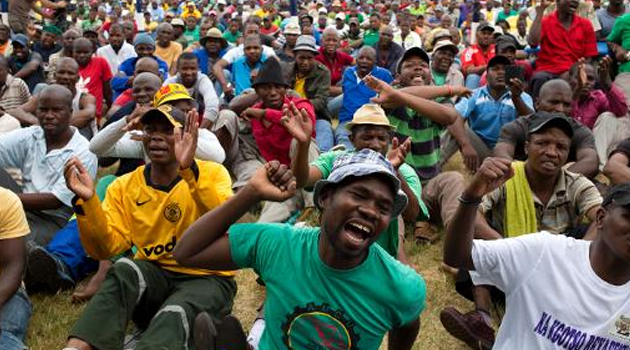
South Africa’s platinum mine workers stage a protest after they rejected a fresh wage offer at a public meeting in Marikana on January 30, 2014/AFP
PRETORIA, June 10, 2014 (AFP) – The South African government and its central bank chief warned Tuesday that strike hit platinum mines could close, throwing miners out of work and rocking an already shaky economy.
The world’s three biggest platinum miners Anglo American Platinum, Impala Platinum and Lonmin have been deadlocked with strikers demanding better pay for nearly five months.
“The situation is grave,” said Mineral Resources Minister Ngoako Ramatlhodi. “The longer the strike goes on the more likelihood of shafts being closed.”
Ramatlhodi on Monday abandoned mediation efforts between AMCU, the union representing the striking workers and their employers after they failed to reach an agreement.
“I suspect there will be job losses, realistically,” he said.
Reserve Bank Governor Gill Marcus said that even if the industrial action were to end now, it is “possible that a number of shafts will never re-open.”
She warned that platinum exports would be hit hard, although the mines have “significant” inventories of the mineral, which is used to make jewellery and catalytic converters in cars.
But these stocks are being depleted and “the longer the strike continues, the sooner the adverse effects on exports will be felt,” said Marcus.
– Recession is unlikely –
The domestic economy is facing “enormous headwinds”, she told a meeting in Johannesburg.
However Marcus dismissed fears of South Africa slipping into a recession, despite the economy contracting 0.6 percent in the first quarter of this year largely because of the strikes.
“Significant further contractions off the already low bases in both the mining and manufacturing sectors”, which would tip the country into a second quarter of contraction and official recession, were unlikely, said Marcus.
But she cautioned “the slowdown we have experienced is domestically driven, largely self-inflicted and we cannot blame external factors alone.”
“And such contractions would have to be of similar orders of magnitude as in the first quarter.”
The South African currency has been under pressure for months and ratings agencies have warned that deficits, high unemployment and slow growth may prompt a credit downgrade to junk bond status.
That could raise the cost of borrowing for the South African government and prompt international investors to look to other faster-growing emerging markets in Africa.
Mining is the bedrock of the South African economy and platinum group metals alone raked in 9.0 percent of export earnings last year.
After months of standing on the sidelines, the government stepped in at the end of May to try to break the deadlock between the Association of Mineworkers and Construction Union (AMCU) and producers.
After the mediation effort collapsed on Monday, the mine operators said they were “committed to a negotiated settlement” but “will now review further options.”
More than 70,000 miners stopped work on January 23 to back their demand that the minimum monthly basic wage be doubled to $1,180 (866 euros), which producers say they cannot afford.
The strike has cost employers $2 billion (1.47 billion euros) in revenue while workers have forfeited about $945 million (695 million euros) in wages and benefits, according to industry figures.
Mining firms estimate the strike has already affected 45 percent of the global supply of platinum.
South Africa holds around 80 percent of the world’s known platinum reserves.


































